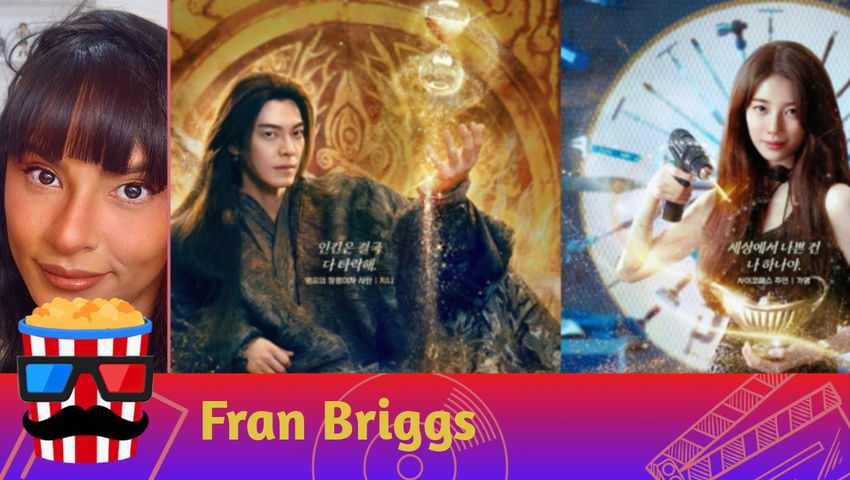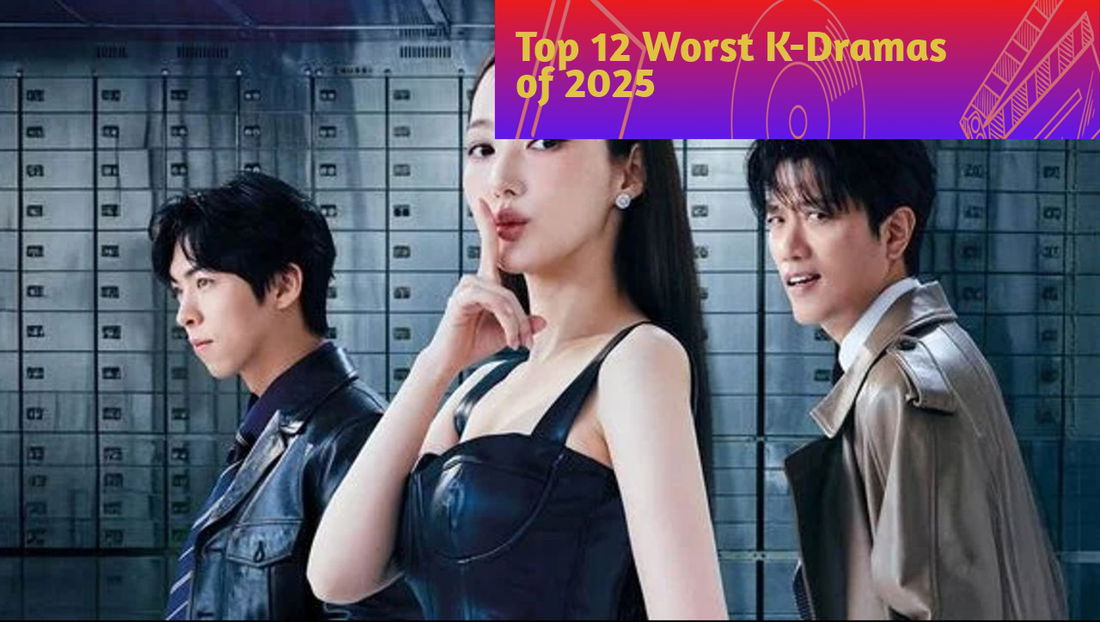The Story of Genie, Make a Wish on Netflix
Released by Netflix in 2025, Genie, Make a Wish is a series created by screenwriter Kang So-yeon and directed by Park Jun-woo. It blends absurd humor, emotional drama, and fantastical comedy.
The series follows the unlikely encounter between an unusual young woman and a genie imprisoned for centuries. Kah-young (Bae Suzy), weighed down by frustration and a constant sense of inadequacy, literally stumbles upon a lamp buried beneath piles of sand in Dubai. She ends up freeing Iblis (Kim Woo-bin), an immortal genie who has been trapped for millennia after breaking the laws of the Celestial Kingdom.

Iblis, accustomed to manipulating greedy humans, expects Kah-young to be just another person seeking money, love, or revenge. But Kah-young, unlike the humans he has met before, wants none of that. From this initial relationship marked by distrust and teasing, a playful dynamic develops and grows deeper with each episode.
Despite its comedic tone, the series explores more complex themes by showing the consequences of fulfilled wishes. Each request Kah-young makes subtly alters the relationships in her life, from friendships to family bonds. Through time travel, reality distortions, and emotional breakdowns, the series creates a mosaic of choices that questions the morality of wishing and the weight of its consequences.
The show received mixed reviews. On one hand, the cast’s charisma, direction, and cinematography were praised. The overall visual aesthetic is strong, from the costumes to the urban settings, and even the simple special effects work well within the show’s fantastical approach.

On the other hand, negative critiques highlight inconsistencies in the show’s internal mythology. The rules around wishes are explained ambiguously. Some episodes emphasize the depth and impact of using magic, while others seem to overlook these rules in order to create quicker conflicts.
Another criticism is the show’s lack of boldness in exploring deeper moral implications of a wish-granting genie in contemporary society. The story often chooses safer narrative routes when it could explore its characters’ psychology more thoroughly.

Good and Evil
Another compelling aspect of the narrative is its portrayal of the tension between good and evil, showing that not everything is simply black or white.
Iblis acts on the belief that humans are inevitably corruptible. He thinks that by granting wishes, he will witness greed, betrayal, and selfishness, and that these outcomes will prove his point.
Meanwhile, Ryu Soo-ryun (Noh Sang Hyun), the “angel who wants to punish Iblis,” represents law, punishment, or a divine plan for justice. However, Ryu often treats humans, the very people he claims are being harmed by Iblis, with indifference, and he relies on questionable methods to achieve his goals, including physically punishing his subordinates.
Not exactly fitting for an “angel” who claims to stand for justice, is it?

The series presents two moral perspectives. One is the vengeful and rational view of the genie who wants to highlight human flaws. The other is the punitive viewpoint of the angel who seeks to preserve a supposedly superior moral standard while holding Iblis accountable for his past, his mistakes, and his pride.
The narrative’s strength lies in this very ambiguity. “Evil” is not portrayed as pure senseless malice, and “good” is not always heroic or pure. Iblis, although antagonistic, has layers. He is capable of love, he has failed, and he is tired. He is not a one-note villain.
At the same time, the humans he encounters are not monsters. Many of them show altruism, doubt, and fear. His belief that humans are inherently corruptible starts to falter as he spends more time with them.

The series also invites viewers to consider where the boundary lies between granting power, represented by the wish, and being responsible for the outcome. Iblis grants the wishes, humans make the choices, and the angel who enforces Iblis’s punishment acts from a moral standpoint that also demands sacrifice, judgment, and strict expectations.
Throughout the series, we see Iblis soften and adjust his behavior toward humans as he forms bonds with them. Meanwhile, Ryu, frustrated by how far he has strayed from his goal, causes harm to humans and eventually hunts Iblis using increasingly unjust methods.

The Psychopath
When introducing Kah-young, the series quickly shows who she is and how she sees the world.
She stands out as a protagonist who is very different from typical heroines in Korean dramas, and the narrative does not try to soften her or hide her flaws. Instead, her characterization reveals someone whose worldview is shaped by emotional detachment and a near total lack of affective connection. This makes her one of the most psychologically intriguing figures among current k-drama characters.

Ka-young’s childhood is the first moment that reveals this trait. The series shows that even in school she was interested in dissecting frogs, not as part of a class but because she enjoyed the experience. The only reason she stopped was due to her loving grandmother, who noticed the behavior and conditioned her to stop.
This external inhibition, rather than an internal or moral limit, is key to understanding the protagonist. Ka-young did not stop out of empathy or guilt but because she was trained to do so.
This isolated trait already shows a distance from the prosocial emotions typically expected in childhood. Cruelty toward animals, interest in harming living beings, or a lack of guilt are, according to clinical research, indicators of developing psychopathic traits.
The series reinforces this throughout its episodes by showing that Ka-young does not naturally interpret the affection of those around her. She does not perceive her grandmother’s concern through emotion but only through facial cues. She struggles to understand the subtleties of friendship and reacts to affection with confusion, as if she were tasting food without ever sensing its flavor.

The story does not portray her as a villain but as someone unable to produce or feel the emotional codes that shape human interaction. Her grandmother tries to compensate for this by imposing strict moral rules in the hope of shaping her into someone more socially acceptable.
Ka-young is not antisocial in the classic sense of ASPD (Antisocial Personality Disorder). She is not aggressive, criminal, or chaotic. However, she clearly represents emotional psychopathic traits. She is not a monster. She is someone born with much lower empathy than average and pushed into a world that demands from her something she never learned how to build.

Her encounter with the genie Iblis works very well from a dramatic standpoint because he challenges her with situations where other people’s feelings matter regardless of external rules. The series suggests that, for the first time, she must learn something that cannot be taught through conditioning: the experience of feeling and recognizing someone else’s emotions.
This is also why her arc is so compelling. The story does not try to turn her into something she is not, and it shows what happens when someone emotionally disconnected must, for the first time, face the impact of emotions, of feeling, of suffering, of caring. And when all of this erupts at once, no heart can withstand the impact.

The Genie
Iblis is described as an ancient genie, as seductive as he is dangerous. He is a spirit bound to a lamp for thousands of years after refusing to accept humankind, losing a war, and making a pact with God: to prove that humanity is corrupt by tempting mortals with three wishes, and if those wishes are selfish, he drags the person’s soul to hell.
But there is one detail: he has already failed once. In the past, a slave from the Goryeo era realized that her wishes had hurt others, so she wished that both she and Iblis would be punished for their mistakes. This completely undermines his idea that all humans are evil.

Thus, Iblis is introduced to us as a weary and cynical character who sees humans as defective toys but who is gradually forced to reconsider his beliefs as the story progresses.
If we compare his profile to concepts already discussed here, such as ASPD and psychopathy, Iblis initially resembles far more an ideological psychopath than a simple impulsive villain.
He is calculating, does not act on impulse, manipulates desires, builds traps, seduces, and tests limits. He has an extremely cold view of humans. To him, others are moral experiments, not people.
But there are two major elements that separate him from pure psychopathy, the kind we see in Ka-young’s profile.

First: moral fatigue. At certain moments, he seems more frustrated than wicked, as if centuries of witnessing human failures have also worn him down. He is not a gleeful predator. He is an ancient being filled with anger, boredom, and resentment. This is very different from a psychopath who finds pleasure in causing harm. For Iblis, cruelty is mixed with exhaustion.
Second: the capacity for attachment. The entire arc of the series is built on something a typical psychopath would not have. He falls in love, suffers, and struggles with his own mission. As he spends time with Ka-young, Iblis begins to remember the altruistic slave from his past, which shows that he does indeed have a core of affection, bonding, and self-sacrifice.
The whole series is the tension between these contradictions until they finally break. He stops being merely the accuser of humanity and becomes one of those willing to sacrifice for it.

The Genie and the Psychopath

At first glance, Ka-young and Iblis seem like opposites. She is a cold human and he is an immortal being ready to test human greed.
But a closer look reveals that both are beings whose connection to affection has been disrupted, each in their own way. This is where the two meet: in the inability to feel love.
Ka-young grows up with an inner world devoid of color. As an adult, she continues to carry this emotional disconnection. She does not recognize her friends’ affection, does not understand her grandmother’s worry and love, and cannot interpret the warmth around her. Affection does not come naturally to her.

Iblis, on the other hand, was not born disconnected. He became this way. After watching humans be selfish, greedy, and violent countless times, he grew cynical. What was once feeling inside him turned into sarcasm, disdain, and contempt for humanity. Yet he still has emotional memory, even if buried. He has loved, trusted, and believed someone could make a wish without harming the world, and that memory eventually became part of his punishment.
The difference between Ka-young and Iblis lies in this origin. She cannot feel because she never could. He cannot feel because he was hurt too deeply. She is born without the ability to access empathy, and he loses it along the way.

This is why something rare happens when the two meet. They function as distorted mirrors of one another.
Ka-young sees, for the first time, someone who does not demand empathy from her but still challenges her. Iblis sees someone who desires nothing from him, someone so corrupted or perhaps even worse than he could ever make her. Two beings who do not know how to love end up pulled, against their nature, into the experience of affection.
If Ka-young represents the emotional void of someone who never learned how to feel, Iblis represents the collapse of someone who felt too much and broke under the weight of it. In the end, the two can be summarized like this: Ka-young is a heart that never switched on, and Iblis is a heart that shut down so it would not die.
And this is precisely why, together, they begin to beat again, flawed and imperfect, and all the more captivating because of it.

Is Genie, Make a Wish Worth Watching?
Absolutely. Prepare plenty of popcorn.
If you want to laugh and also get emotional with an ending that is sad and happy at the same time, then yes, that is exactly what you will get. Watch it.
The highlight for me is the humor. The series fully embraces the absurd and the ridiculous, and whenever it breaks the fourth wall, it is brilliant. One of the best dialogues I have ever seen in a k-drama, involving copyright law, appears in this show. Simply ingenious.

If you are looking for a romance with humor, a touch of suspense (there is a much worse psychopath in the show, even though the subplot is brief), moral questions about the consequences of your wishes and the pain that comes with empathy, then this series is for you.
If a genie appeared before you right now, what would your three wishes be, the ones you would ask for without thinking twice and the ones you might be afraid to admit? Tell us in the comments!













— Comments 0
, Reactions 1
Be the first to comment